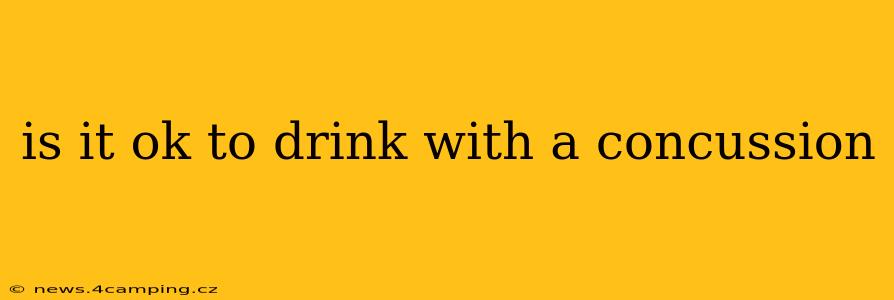A concussion, a type of traumatic brain injury (TBI), is a serious injury that requires careful management and rest. Absolutely do not drink alcohol if you have a concussion. Alcohol can significantly worsen the symptoms and prolong recovery time. This is not a matter of personal preference; it's a matter of your neurological health.
Here's why alcohol and concussions are a dangerous mix:
-
Increased Inflammation: Alcohol is an inflammatory substance. Your brain is already inflamed after a concussion. Adding alcohol exacerbates this inflammation, potentially leading to increased swelling and pressure within the skull. This can delay healing and even lead to more severe complications.
-
Impaired Healing: Your brain needs time and optimal conditions to heal after a concussion. Alcohol interferes with this process, disrupting the body's natural healing mechanisms and potentially prolonging recovery.
-
Exacerbated Symptoms: Common concussion symptoms like headaches, dizziness, nausea, and confusion can be significantly worsened by alcohol. Alcohol can also amplify cognitive impairment, making it harder to concentrate, remember things, and perform daily tasks.
-
Increased Risk of Complications: In severe cases, alcohol consumption after a concussion could increase the risk of developing post-concussion syndrome (PCS), a condition characterized by persistent symptoms that can significantly impact daily life.
-
Drug Interactions: If you're taking medication prescribed for concussion symptoms, alcohol can interact negatively with these medications, leading to potentially harmful side effects or reduced efficacy.
What Happens If You Drink Alcohol With a Concussion?
The effects of alcohol on someone with a concussion can vary depending on the severity of the injury and the amount of alcohol consumed. However, even small amounts of alcohol can worsen symptoms and hinder recovery. You may experience:
-
Intensified Headaches: Headaches are a common concussion symptom, and alcohol can make them significantly worse, potentially triggering migraines.
-
Increased Dizziness and Nausea: Alcohol can exacerbate feelings of dizziness and nausea, making it difficult to function and potentially leading to vomiting.
-
Cognitive Impairment: Difficulty concentrating, remembering things, or processing information can be amplified by alcohol consumption.
-
Sleep Disturbances: Alcohol can disrupt sleep patterns, which are already often affected by a concussion. Poor sleep further hinders recovery.
-
Delayed Recovery: The overall healing process can be significantly delayed, extending the time it takes to return to normal activities.
What Should You Do Instead of Drinking?
Focus on rest, hydration, and following your doctor's instructions. This may include:
- Rest: Avoid strenuous activities, both physical and mental.
- Hydration: Drink plenty of water to help your body heal.
- Nutrition: Eat a healthy, balanced diet.
- Medication: Take any prescribed medications as directed.
- Follow-up care: Attend all scheduled follow-up appointments with your doctor.
How Long Should You Avoid Alcohol After a Concussion?
There's no set timeframe for avoiding alcohol after a concussion. It's crucial to consult with your doctor or healthcare provider. They will assess the severity of your concussion and advise you on when it's safe to resume alcohol consumption, if ever. It's always safer to err on the side of caution and avoid alcohol until you've fully recovered.
What are the Long-Term Effects of Drinking Alcohol After a Concussion?
While the immediate effects are concerning, long-term effects of alcohol consumption following a concussion are also a serious issue. It may increase the risk of prolonged cognitive deficits, persistent headaches, and the development of post-concussion syndrome. Prioritizing complete recovery by avoiding alcohol is essential for long-term brain health.
In Conclusion: The risks associated with alcohol consumption after a concussion significantly outweigh any potential benefits. Prioritize your brain health and recovery by abstaining from alcohol until your doctor advises otherwise. If you have any concerns about a concussion, always seek medical attention promptly.
